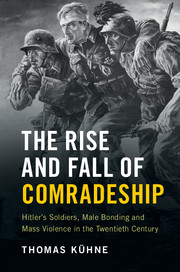Crossref Citations
This Book has been
cited by the following publications. This list is generated based on data provided by Crossref.
2017.
BOOKS RECEIVED.
Church History,
Vol. 86,
Issue. 3,
p.
961.
Dillon, Christopher
2018.
Commentary: Masculinity and the Racial State.
Central European History,
Vol. 51,
Issue. 3,
p.
513.
Mailänder, Elissa
2018.
Whining and Winning: Male Narratives of Love, Marriage, and Divorce in the Shadow of the Third Reich.
Central European History,
Vol. 51,
Issue. 3,
p.
488.
Westermann, Edward B.
2018.
Drinking Rituals, Masculinity, and Mass Murder in Nazi Germany.
Central European History,
Vol. 51,
Issue. 3,
p.
367.
Crouthamel, Jason
2018.
Homosexuality and Comradeship: Destabilizing the Hegemonic Masculine Ideal in Nazi Germany.
Central European History,
Vol. 51,
Issue. 3,
p.
419.
Harvey, Elizabeth
Hürter, Johannes
Umbach, Maiken
and
Wirsching, Andreas
2019.
Private Life and Privacy in Nazi Germany.
Galán Ortega, José
2020.
O relato histórico no mito: Enrique Líster e a batalla das palabras.
Madrygal. Revista de Estudios Gallegos,
Vol. 23,
Issue. ,
p.
185.
Little, Daniel
2022.
Confronting Evil in History.
Rahi-Tamm, Aigi
and
Esse, Liisi
2022.
‘In spite of everything, life is still beautiful!’ war and postwar experiences in Estonia on the example of Oskar Nõmmela’s life story (1893–1969).
Journal of Baltic Studies,
Vol. 53,
Issue. 2,
p.
249.
Hidayah, Sita
and
Rohrer, Ingo
2023.
In Tandem – Pathways towards a Postcolonial Anthropology | Im Tandem – Wege zu einer postkolonialen Ethnologie.
p.
87.
Ludwig, Pascal
2024.
Pourquoi les perpétrateurs de génocides obéissent-ils ?.
Philosophia Scientae,
Vol. 28-2,
Issue. ,
p.
33.



